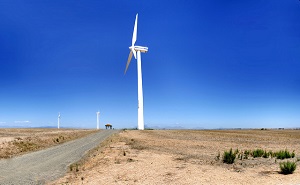Five challenges Africa must address to achieve a green economic revolution
04 October 2018

Strong leadership, smart incentives and an inclusive approach are among the requirements if African nations are to successfully put the environment at the heart of their economic growth.
This was the finding of international researchers involved in a project led by the University of Reading. The Governing Inclusive Green Growth in Africa (GIGGA) Network is setting out a framework for robust assessment and understanding of green growth governance in Africa.
Professor Chuks Okereke, Professor of Environment and Development at the University of Reading, and project lead, said: “Green economy has immense potential in Africa, but it is an area that is very poorly understood in the continent due to a lack of research. There is an opportunity for many African countries to leapfrog more developed economies by integrating green schemes at this early stage in their growth.
“We are seeking to help countries put green initiatives at the centre of their development, by laying the foundations for an inclusive, structured approach to transforming economies.”
The research team assessed more than 950 academic literature and 500 high-profile economy activities in Africa, particularly in Ethiopia, Kenya, Nigeria, Rwanda and South Africa, to develop a research agenda on governing inclusive green growth in Africa to inform future ESRC and Global Challenges Research Fund (GCRF) funding activity. Inequality and poverty are still issues across the continent, while economic growth is still largely reliant on natural, non-renewable resources.
They identified five areas where more research is needed to identify opportunities and limitations for green growth for Africa’s economy:
- Infrastructural investment Infrastructure, such as roads, airports, housing and power stations, in many African countries is not adequate for the population, while many have limited access to electricity and clean water. A positive aspect is that there is little environmentally-damaging infrastructure to be replaced, offering a blank canvas for green development. New funding, both from public and private sources, is needed.
- Institution Most progress in pushing green growth in Africa so far has come from strong political will and leadership. It is a key research challenge to understand what model of governance allows such arrangements to work. Some deep-rooted laws and behaviours also need to be modernised.
- Incentives Many countries have plans, but few have been translated into policies with clear incentives and penalties. Workshops run by the project team identified a lack of ownership of green policies by African governments.
- Innovation Limited funding, infrastructure and human/technical capacity is currently hindering innovation, which is crucial for agriculture and waste management plans. Increased green innovation research capacity at universities and research institutions is needed. Most funding currently comes from Europe, which means research agendas may not be focused on African concerns.
- Inclusiveness There is currently large gap between the rich and poor in Africa, but green growth emphasises equity and social inclusion. For example, cooking and farming initiatives directly benefit poorer communities. Environmental initiatives are often at odds with social ones, and corruption in government and private sectors is an issue, so more research is needed to ensure green growth does not harm poorest communities.
The GIGGA Network was formed to respond to the Global Challenges Research Fund (GCRF) Strategic Networks call in 2016. It is a multidisciplinary research group, also including African think tanks, civil society organisations and government departments.
The Network is backed by £145,000 by the Economic and Social Research Council (ESRC), and won a £15,000 grant from the Global Challenges Research Fund.
The GIGGA Network project will be profiled as part of Green Great Britain Week by the European and Social Research Council (ESRC). The week, starting 15 October, is a new initiative that seeks to highlight opportunities presented by clean growth and allow the UK government to support climate action.
A video produced by the network on the challenges of governing inclusive green growth in Africa is available here https://www.youtube.com/channel/UCQsxTSp7OinGfGX3uduVQPw?view_as=subscriber
Image credit: Warren Rohner, 2008, Klipheuwel Wind Farm. Accessed at: https://www.flickr.com/photos/warrenski/2275020795. CC BY-SA 2.0
